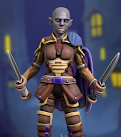Duergar, devoted defenders
Duergar, the devoted.
Traditions: Martial, Occult
“Every man has his place.
Ours is to hold the line. We hold
the line when the Bane or their minions attack. The Tyrants lead, the Warriors
fight, the Merchants produce and trade. The lesser castes serve their
betters. It is the Law and the Way of
Order. We bring order to the darkness.
The Rubble fled.
Flawed, and crumbled when tested, like a poorly made blade that shatters
when quenched, they were cast aside. The
tell themselves that we, the Duergar, are traitors. We know the truth. We, the Duergar, are Defenders.” – Sokar,
Warrior caste.
When the Dwarves called the first blights to bring down the
empire of Joturc, they had no idea what they had released. The blights grew in power, adapted, and once
they had brought down the enemies of the dwarves, turned on their
creators.
Caught unaware, the initial losses of the deep people were
tremendous. The council decided to
retreat, to flee, was the only option. Borlin Duergar, head of his house,
disagreed.
House Duergar, along with others who rallied to his banner
retreated to their iron cities to prepare.
When the blights sent their corrupted creatures after the fleeing
dwarves, the followers of Duergar struck their flank, tearing into the
leadership and splitting them from their minions. The costs were horrible, over a fifth of
Duergar’s followers perished. But the
blights were forced to retreat, the dwarven people were saved.
Both the duergar and the blights retreated to lick their
wounds. Borlin could not send any
support for their retreating brethren, nor did he want to. He told his followers they could have
destroyed the monsters created by their priests, if only they’d had the
reinforcements of the other houses. He
named them rubble, for the destruction of their way of life. The remaining dwarves took their name from
their leader. Dwarves no more, they were
all of duergar.
Borlin led the people in harsh reforms. Always a practitioner of psychic talents, he
adopted others with similar talents into his family. Whether by the strength of
his charisma or his talents, he re-ordered the caste system, casting the
priesthood down. They became a
cautionary tale, reminding the duergar that their strength of arms and prowess
carried the day, not the followers of the gods who brought them the blights in
the first place. He tightened the caste system and forbid testing into higher
castes. Marriage and adoption were still
possible, to help keep Duergar of exceptional psychic talent in the tyrant
caste. The society turned to one goal,
subjugation of the Deeps to stop the blights from threatening the duergar
people ever again.
Duergar today.
The Duergar have calcified their caste system in the
hundreds of years since the great siege.
They rule their underground domains with an inflexible fist. The law is the only thing that holds back the
chaos and the blights. Dissent is not
allowed, and weakness is crushed. While
this has stifled innovation, the duergar know that they are the force that
keeps their greatest mistake at bay.
The most powerful caste is the Tyrant caste, that claims descent
from Borlin Duergar’s family itself. Those
Duergar of the strongest psychic talents in other castes are often adopted into
the Tyrant Caste. They are the undisputed rulers of the duergar and coordinate
the defense of the empire.
The warriors are held in regard second only to the
Tyrants. The warrior caste maintains the
law, fights the threats of the deeps, and leads the battles when houses go to
battle with each other. Martial, psychic, arcane, the duergar take any method
of war as part of their caste. What few trained divine casters the duergar
still use are part of this caste. These
casters get their powers from ancestors and
Next are the scholar caste.
Generally barred from learning any of the battle arts, the scholars are
the researchers. There are a few still
that possess formidable psychic or martial talents, but they are restricted
from legally developing them.
Below the scholars are the merchant castes, both craftsmen
and traders fall into this category. The
lowest of the merchant caste are the duergar that deal with the non-duergar
races, the inadam.
Below the merchants are the laborers. Builders, miners, porters, laborers, the
unskilled fall in this group. The
largest group is the weakest but are still taught they are important and have a
role in society.
The lowest caste is not considered a case. The slag, the untouchables, the rubble. By default any non-duegar dwarves fall in
this caste. They have no rights, no
recourse. They exist to serve their
betters, but are little more than property, and not considered true duergar.
While officially non-existent, the followers of the dwarven
gods do exist in secret. Hunted and persecuted, they are normally found only
among the rubble
Relations with other races:
Duergar are insular and xenophobic at the best of
times. Interaction with other races is
limited to designated trade cities and strongly monitored. That dwarves and
duergar both are immune to the corruption of the blight increases their insular
nature. While in their trade cities the duergar treat non-duergar with what
respect that the inadam earns by his own power and wealth, non-duegar
are considered untouchables if found anywhere else, to be captured, made
slaves, or killed. Of course even in the
safety of the trade towns they are watched and punished for breaking laws, even
if they don’t know the laws. Ignorance
is no defense.

Comments
Post a Comment